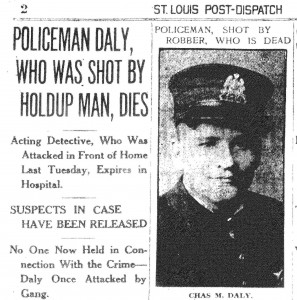Dan Daly Beats Ed Kelly
U prosincu 1920, robbers killed Patrolman Charles Daly at the entrance to his home in the 4000 block of Forest Park Boulevard. St. Louis Police aggressively investigated the murder but it was never solved. Prior to his death, the Daly name was already well-known in St. Louis.
Charles Daly was the son of professional prizefighter Dan Daly, who fought in the 1880s. Considered the Missouri Champion, Daly fought in gloved contests under Marquis of Queensberry rules.

Daly from the Saturday, Prosinac 11, 1920 edition of the St.. Louis Post-Dispatch
One of these fights occurred on Tuesday, Kolovoz 26, 1887, when Daly fought Ed Kelly in one of the longest Marquis of Queensberry rules prize-fights of all time. He and Kelly fought 63 rounds over almost 4 hours.
Prizefighting was illegal in most states, including Missouri, during the 19th Century. After Daly and Kelly agreed to put up $250.00 a side for the fight, they had to find a venue for the contest. The men settled on Hurricane in Lincoln County, Missouri.
Hurricane was selected because it was about 60 miles outside of St. Louis, well outside the reach of the St. Louis policije, but accessible by the St. Louis and Keokuk trains. The camps still maintained secrecy in case St. Louis Police tried to notify the Lincoln County Sheriff’s Office.
The men arrived in Hurricane, then made their way to the ring. The fight began at 12:17 pm. It would not finish until 4:15 pm. Daly was seconded by Charlie Woods and “Artie” Flint. These men were partners in a St. Louis bar and underground fight club with Daly and his brother.
Ed Kelly was seconded by his father Tom Kelly and Tom Allen. As the principal second, Tom Kelly would witness the one-sided affair and struggle between his duties as a second to his competitor and a father worried about his son.
Daly began the fight liberally striking Ed Kelly with powerful right hands. After the first few rounds, Daly damaged the right hand. Daly switched tactics and began probing the distance with his right hand. Once he got close with the right hand, he would land several left hooks to the body and jaw.
Daly used this tactic so many times, the local reporter stated it almost became like a dance. Every once in a while, Daly would gut it out and use the right hand. In the late rounds, Daly threw a 16-punch combination that had Ed Kelly rocked. His noticeable wincing showed Kelly was not the only one taking damage.
After about the 40th round, Tom Kelly would ask in the 1-minute rest between rounds, “I, do you want me to stop it?” Ed Kelly would say, “Ne!” Then Ed would go out and get smacked around again.
At the end of the 60th round, flesh was hanging down from Ed Kelly’s lip. Tom Kelly cut off the loose skin with a knife and threw it in the grass. Finally in the 63rd round, Tom Kelly could take it no longer. He threw in the sponge. His son was too tired to protest as his father helped him out of the ring.
Ed Kelly remained in Lincoln County confined to a bed for a couple of weeks. Pocketing the $500 purse and $440 gate receipts from the 60 spectators, Dan Daly took a circuitous route back to St. Louis through St. Paul, Missouri. Daly still feared being arrested.
40 of the spectators actually didn’t stick around for the end of the long fight. Tiring of the one-sided match and fearing arrest themselves, they took the St. Louis and Keokuk 3:30 pm train back to St. Louis. They read about the results in the next day’s St. Louis Post-Dispatch.
Daly continued to operate a fight club out of his saloon. Ironically, the Dan Daly saw his son join the organization he did his best to avoid.
If you liked this story, you may enjoy my book on 19th Century prizefighting Morrissey vs. Za available on Amazon in paperback and e-book.
You can leave a comment or ask a question about this or any post on my Facebook page.
Sources: St. Louis Post-Dispatch, Travanj 27, 1887 edition, p. 3

